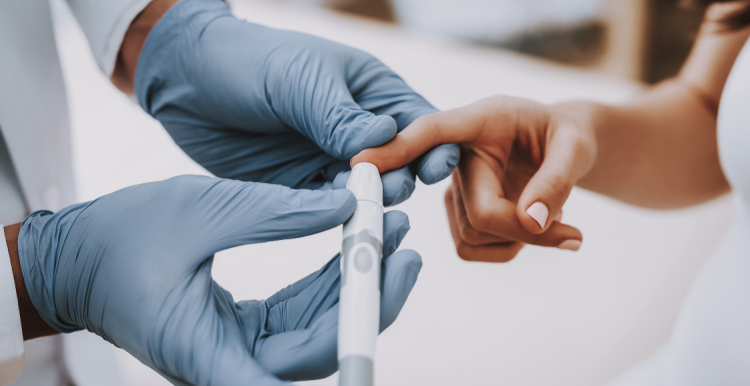What are the symptoms and treatments for diabetes?

The number of people living with diabetes is at an all-time high. Knowing more about the condition and its symptoms can help you take steps to support your health.
What is diabetes?
Diabetes is a long-term condition that causes high blood sugar levels. When there is sugar in our blood, the pancreas produces insulin to help our bodies absorb it. People with diabetes aren't able to produce insulin or can't produce enough to help regulate their blood sugar levels.
What types of diabetes are there?
Type 1 diabetes: People with Type 1 can't produce insulin. Type 1 is considered an autoimmune disease. If you have a family history of diabetes, you're at a higher risk of developing Type 1. However, it's far less common than Type 2 diabetes. Only 8% of people with diabetes are diagnosed with it.
Type 2 diabetes: People with Type 2 may not produce enough insulin, or the insulin they produce can't effectively manage their blood sugar levels. 90% of people diagnosed with diabetes will be diagnosed with Type 2. Certain lifestyle factors, including weight and age, can cause Type 2 diabetes, but some ethnicities are more likely to develop it than others.
At least 2% of people are diagnosed with other, rarer forms of diabetes, including Gestational Diabetes.
Have your say
Have you recently been diagnosed with diabetes? Or have you been living with the condition for a while? We want to know more about your experiences of diabetes diagnosis, treatment and support.
What are the symptoms of diabetes?
The most common symptoms of diabetes that you should look out for are:
- Needing to pee a lot, especially at night.
- Feeling very thirsty.
- Feeling more tired than usual.
- Losing weight without trying to.
- Genital itching or thrush.
- Cuts and wounds take longer to heal.
- Blurred eyesight.
- Increased hunger.
- Fruity-smelling breath.
Speak to your GP if you're experiencing any of these symptoms. You can also get tested for diabetes for free at your local Pharmacy.
What treatments are available?
Diabetes can be carefully managed with a combination of medication, diet and lifestyle changes. Treatments differ slightly depending on the type of diabetes you are diagnosed with.
The main ways you can manage Type 1 diabetes are:
- Insulin injections or insulin pumps
- Carb counting and eating well
- Being physically active
- Maintaining a healthy weight
- Using a continuous glucose monitor (CGM) or flash glucose monitor
Some people with type 1 diabetes may also use a closed-loop system, also called an artificial pancreas. It’s another way to help you manage your type 1 diabetes without having to do much of the work yourself.
The main ways you can manage Type 2 diabetes are:
- Eating a balanced diet
- Exercising and moving regularly
- Losing weight
- Metformin (usually taken as a tablet)
- Insulin injections
Some people with Type 2 diabetes use a flash glucose monitor or continuous glucose monitor to monitor their blood sugar levels instead of doing multiple finger prick checks.
With most forms of diabetes, people are advised to move more and eat well. Regular activity and a balanced diet can support your body's ability to respond better to insulin.
Diabetes UK have created a suite of new content on diabetes drugs and updated its existing medication pages for people living with diabetes. There are now have new web pages for various diabetes drugs, as well as a new page dedicated to weight loss medications. They have also updated the web pages on drug classes (such as GLP-1 agonists), so that all of these pages are consistent, informative and easy to read.
Need more support?
If you want to know more about diabetes, treatments and available support, check out these valuable resources:
British Heart Foundation - Diabetes - causes, symptoms and treatments


